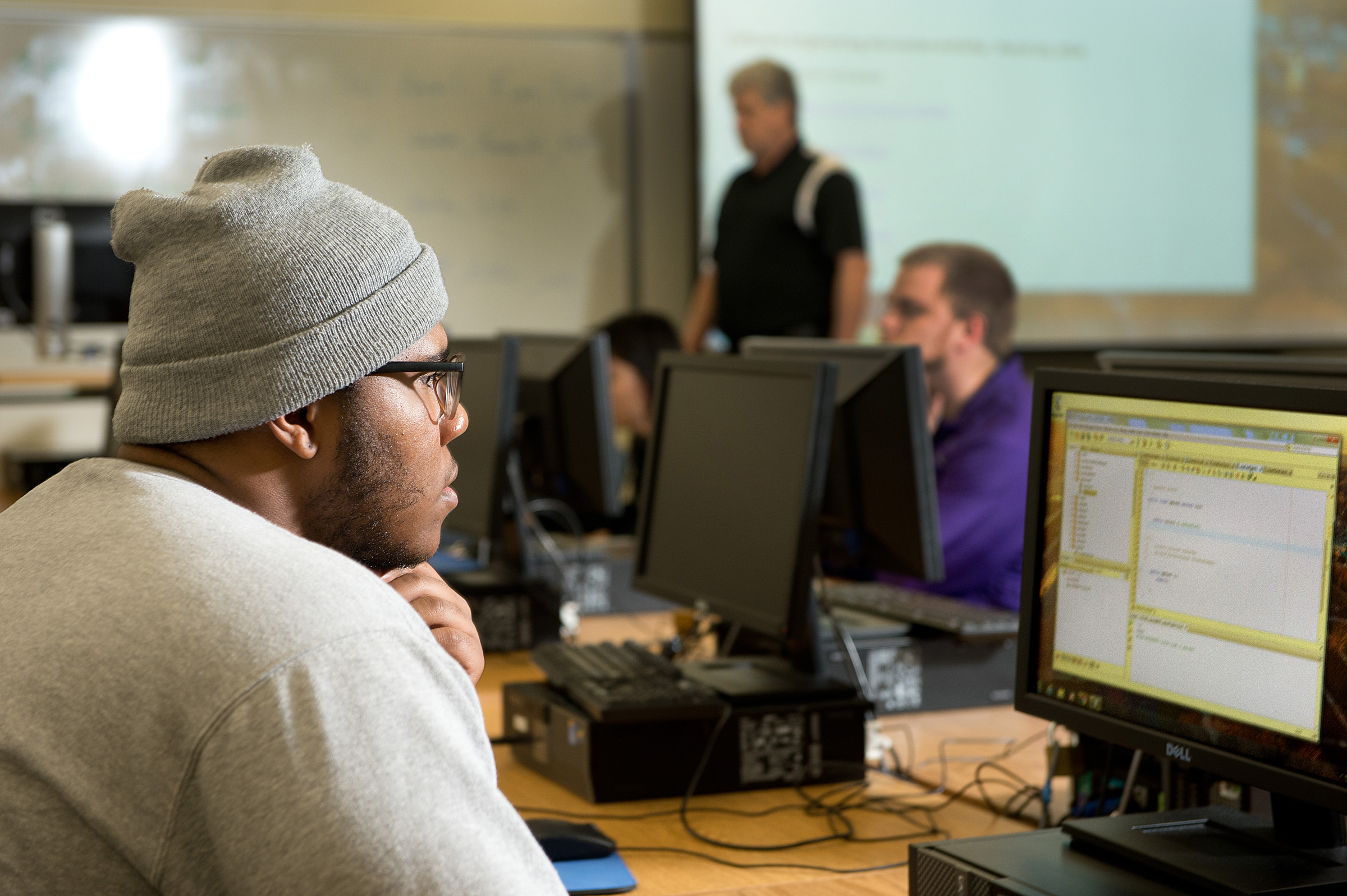Bachelor of Science in Computer Science Degree
Dominate your career with our Bachelor of Science in computer science degree. Whether your desire is to develop software systems, be a project manager, or an AI engineer, our computer science degree program will give you valuable hands-on skills to transform the technology industry. Mount Union is among the best schools for computer science undergraduates, offering a curriculum designed to prepare you for real-world success in this ever-evolving field.
Expert faculty in the computer science degree program lead by example giving you the opportunity to conduct faculty-led, group, or independent research to sharpen skills attained in class. You will be positioned for internships with recognized employers, allowing you to gain confidence through interactions with industry professionals.
About the Program
The computer science degree at Mount Union will prepare you to enter the real world as a strong-minded professional able to solve technological and current problems. As a student pursuing a computer science degree, you will build your network through connections within the Society of Computing Students or student employment as an IT Help Desk or lab assistant.
Computer Science Quick Facts
- 56 credit hours within the computer science degree program
- 32 credit hours from the Integrative Core (IC)
- Intern at recognized companies
- Grow your professional network and prepare for jobs you can get with a computer science degree
Learn more about the Degree in Computer Science
Achieve your academic goals through hands-on skills in developing mobile apps or software systems with the Bachelor of Science degree in computer science from Mount Union. Drive your career in the path you want to with the support from faculty guiding you based on years of experience in the field.
-
Curriculum
As a computer science major, you'll be exposed to in-depth study of programming, computer organization, algorithms and data structures, theories and applications, networks, and operations systems. Not only will you study courses that focus on computers, but you will also study discrete mathematics, statistics, and calculus, which will prepare graduates to enter technological fields such as systems programming, technical support, research, and teaching.
COMPUTER SCIENCE LEARNING OBJECTIVES
- Students will demonstrate the ability to extend current knowledge and/or skills to a computing environment or problem currently unknown to the student.
- Students will demonstrate the ability to solve problems in the discipline.
- Students will demonstrate interpretive skills, incuding the ability to: a) analyze data statistically, b) interpret results of experiments, c) draw reasonable conclusions based on experimental results.
- Students will learn and demonstrate standards of professional behavior, including rules of ethics and etiquette.
- Students will develop and demonstrate the ability to work effectively in a group on a common problem.
- Students will demonstrate the ability to search the relevant literature of the discipline to find information that addresses a specific problem.
- Students will demonstrate the ability to produce a technical document.
- Students will demonstrate the ability to give an effective presentation using visual aids and/or software demonstrations.
View our University Catalogue to learn more.
-
Experiential Learning
Computer Science majors can participate in off-campus internships, independent study projects, part-time computer employment, lectures by guest speakers, Society of Computing Students, programming, and on-campus employment as lab assistants, lab supervisors, and HelpDesk assistants. These many opportunities to get "real-world" experience outside of the classroom will better prepare graduates for a successful technological-based career and graduate school.INTERNSHIPS
Internships provide you the chance to go into the workforce and gain hands-on experience, which is critical to finding a job after graduation. Internships provide a significant learning experience outside the traditional academic environment and it can be tailored to align with your career goals. Mount Union students have the opportunity to pursue challenging internships with industries in the region including:
- Patriot Software
- H-P Products
- Progressive Insurance
RESEARCH
Research allows you to analyze and investigate areas that you're most interested in. Students at Mount Union have the following research opportunities:
- Independent research study
- Research with faculty or student peers
-
Careers
RECENT EMPLOYERS
Patriot Software
Synergy Systems
United States Department of Defense
Cardinal Health Quadax Software
Google
FirstEnergy
RECENT GRAD SCHOOLS
University of Washington
University of Pittsburgh
Kent State University
Case Western Reserve University
Florida State University
University of Illinois
Uniersity of Michigan
The Ohio State University
University of North Carolina
COMMON CAREERS
Systems programming
Network administration
Computational science
-
Facilities and Equipment
Facilities and EquipmentThe Computer Science Labs, located in the Kolenbrander-Harter Information Center (KHIC), contains Windows workstations with access to Linux and OSX systems with a variety of specialized software, a computer projection system, and a group project and study spaces. Besides the large, main lab, the department has two small labs for special projects.






